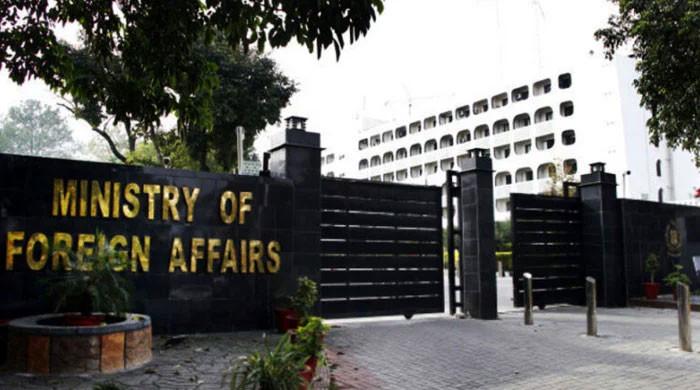US President Announces 90-Day Pause on Tariffs
- US President Trump announces 90-day pause on tariffs.
- Earlier, he imposed 29% tariffs on Pakistani exports to US.
- Global UGRAD played key role in promoting academic linkages: FO.
Foreign Office Spokesperson Shafqat Ali Khan stated on Thursday that Pakistan is monitoring the tariff situation with the US, including the recent suspension affecting numerous countries.
During the weekly press briefing, the FO spokesperson commented on the interconnected nature of global trade, noting that tariff impositions could have widespread effects and stressing the need for mutually beneficial resolutions.
Last week, US President Donald Trump intensified the trade conflict by introducing a baseline 10% tariff on all imports, along with increased duties on key US trading partners and a 29% tariff on Pakistan.
Following global market instability, President Trump announced on Wednesday that he would temporarily suspend many of the new tariffs for 90 days, even as he increased tariffs on imports from China.
“I have authorised a 90-day PAUSE” on higher tariffs that took effect on Wednesday, Trump announced on his Truth Social network. He attributed the decision to over 75 countries reaching out to negotiate and refraining from retaliating against the United States.
Only a flat rate of 10% tariffs on all countries, which took effect on Saturday, will remain. This marks a significant shift from the previously punitive levies that impacted even the closest US allies.
According to a report by the Islamabad-based think tank Tabadlab, Pakistan could face approximately $564 million in export losses in fiscal year 2025-26 due to the steep new tariffs imposed by the US under President Donald Trump’s recent trade policy adjustments.
The Pakistani government announced that a delegation would be sent to the US in the coming weeks to negotiate new tariffs, before Donald Trump declared a delay to the measures, AFP reported.
Concerns about potential repercussions persist. If negotiations fail, the textile sector, responsible for over half of Pakistan’s exports to the US, is expected to be most affected. Given the price sensitivity of US consumers, Tabadlab projects a potential demand decline of at least 13% by FY2025-26. Should Pakistan experience both market share and demand losses, export losses could surge to $2.17 billion in a worst-case scenario.
“These tariffs may negate recent export gains across critical sectors, thereby undermining current account stability and exacerbating an already fragile economic outlook,” the report cautioned.
Pakistan’s total exports to the US currently amount to around $6.3 billion annually. The new tariffs pose a significant challenge as the country attempts to bolster its external account and stabilise economic growth.
Data regarding trade between Pakistan and the US indicates that imports from the US totalled $1.87 billion in 2024, representing only 4.0% of Pakistan’s total imports. The US share in Pakistan’s top five import segments was even lower, at 1.4 per cent, suggesting minimal reliance on American goods.
Top US exports to Pakistan include pharmaceuticals ($147 million), machinery ($143 million), and iron and steel ($190 million). However, tariff revenue generated from these imports remains modest, at just $85 million, with an average effective tariff rate of 4.5%, considerably lower than Pakistan’s overall import tariff average of 8.0%.
According to the Trump administration’s calculations, Pakistan imposes 58% tariffs on goods from the US.
The administration employed a formula that economists consider misleading to calculate the rate of tariffs, dividing the US trade deficit with a country by total US imports to that country.
Pakistan’s zero tariff on US cotton and limited protection for sectors like scrap metal or medical equipment indicate little immediate potential for reciprocal tariff leverage during negotiations.
Global Undergraduate Exchange Programme
Regarding the discontinuation of the Global Undergraduate Exchange Programme (Global UGRAD) for Pakistani students, the FO spokesperson noted that the decision marked the conclusion of a 15-year initiative that played a crucial role in fostering academic and cultural connections, as well as strengthening bilateral relations through education, science, technology, and people-to-people interactions.
In response to a question, the FO spokesperson stated that the ongoing repatriation of illegal foreign nationals from Pakistan is being conducted under a legal framework, allowing individuals to return to Pakistan after obtaining a visa.
He added that Pakistan has been exceptionally generous in hosting Afghan nationals compared to other countries worldwide and reiterated the government’s commitment to ensuring the dignified return of those residing illegally.



Comments (0)
No comments yet. Be the first to comment!
Leave a Comment